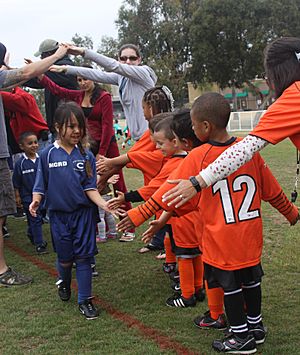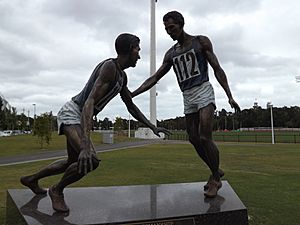Sportsmanship facts for kids

Sportsmanship is all about playing a game or doing an activity in a fair and respectful way. It means enjoying the game itself, showing respect to everyone involved, and having a friendly spirit with your competitors.
When someone is a "good sport," it means they know how to be a good winner and a good loser. They handle both victory and defeat with grace. On the other hand, a "sore loser" is someone who gets upset or acts unfairly when they don't win.
Contents
Showing Good Sportsmanship
Being a good sport can be shown in many ways. It often means treating others how you would like to be treated yourself. This includes cheering for great plays, even if the other team makes them! It also means taking responsibility for your own mistakes and keeping a positive attitude.
Some common examples of good sportsmanship include:
- Shaking hands with your opponents before or after a game.
- Helping an opponent who might have fallen down.
- Encouraging everyone on the field or court.
- Clapping or giving high-fives to show support.
- Being respectful to your teammates, the other team, coaches, officials, and even parents watching the game.
A famous saying about sportsmanship is: "It's not whether you win or lose, it's how you play the game." This reminds us that effort and attitude are more important than just the final score.
Real-Life Examples in Sports
Sportsmanship can look different depending on the sport or the culture.
- In cricket, a player might know they are out (meaning they have to leave the game) even if the umpire (the game official) didn't see it. They will sometimes just walk off the field, showing honesty and respect for the game.
- In tennis, a player might see that a ball was actually in bounds, even if the linesperson called it "out." A good sport might tell their opponent to challenge the call, or even just give them the point. For example, professional tennis player Jack Sock did this on at least two occasions, showing great fairness.
Why Sportsmanship Matters
Many things can affect how people show sportsmanship. These include a player's own values and how they feel about the sport. Also, professional athletes, who are often seen as role models, have a big influence.
The Power of Role Models
Professional athletes are expected to act in a fair and respectful way. When these elite athletes show good sportsmanship, it encourages younger players to act similarly. However, if a role model shows poor behavior or makes bad choices, it can unfortunately lead others to think that such actions are acceptable. It's important for athletes to remember that many people look up to them.
Leadership and Team Spirit
Good sportsmanship is also closely linked to strong leadership. When a sports team has a positive environment, it helps everyone on the team show good sportsmanship. This positive feeling comes from good leadership by captains, coaches, and even supporters. When everyone works together to create a respectful atmosphere, it makes the sport more fun and fair for all.
See also
 In Spanish: Juego limpio para niños
In Spanish: Juego limpio para niños
- Lady Byng Memorial, a trophy given by the National Hockey League to the player who shows the best sportsmanship
- Cricket: Spirit of the Game
- Pierre de Coubertin World Fair Play Trophy, a special medal given for amazing acts of sportsmanship, even when it might put the player at a disadvantage
- Fair Play Award (disambiguation)
- Fair Play Trophy (disambiguation)
- Gamesmanship
- Football War
- Ultimate (sport)
- Unsportsmanlike conduct
- Unwritten rules of baseball
 | Aurelia Browder |
 | Nannie Helen Burroughs |
 | Michelle Alexander |




